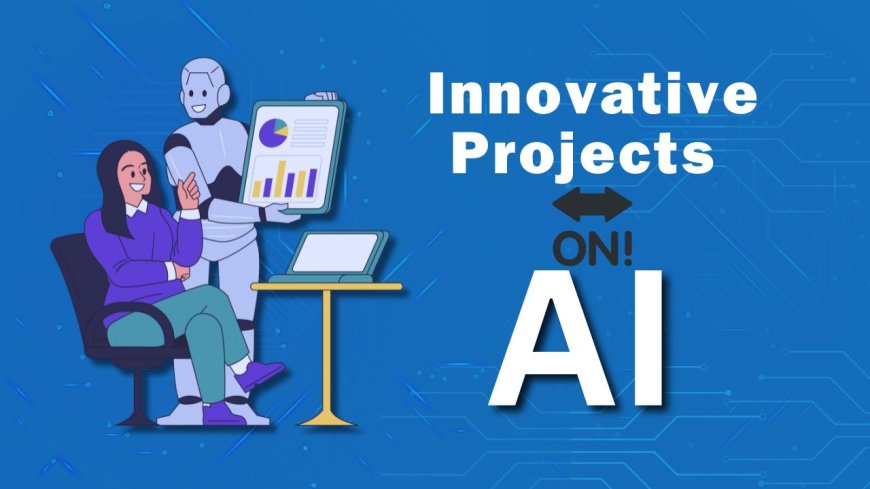Innovative Projects on Artificial Intelligence
Explore diverse projects on artificial intelligence showcasing innovative applications. Enhance AI development with ML, neural networks, and deep learning.

Projects on Artificial Intelligence are bringing fresh ideas to various industries, helping to solve everyday problems in creative ways. These projects often use a variety of AI tools to make tasks easier, improve decision-making, and handle large amounts of data efficiently. For example, AI in healthcare is being used to predict patient outcomes and suggest personalized treatments. AI experts are also applying AI in finance to help detect fraudulent activities and enhance investment decisions. These projects show how AI can be a valuable addition to many different areas, making processes more effective and straightforward.
In the world of innovation, projects on artificial intelligence are opening up new possibilities, especially in tackling issues like environmental sustainability and cybersecurity. For instance, AI is being used to monitor environmental changes and provide helpful insights for more sustainable practices. In cybersecurity, AI experts are developing tools to detect and prevent threats in a timely manner. These initiatives demonstrate how AI can be an important tool in addressing various challenges, making it a useful resource across different fields. By continuously improving AI tools, these projects help create a future where AI plays a helpful role in many aspects of our lives.
1. AI in Healthcare: Predictive Analytics and Diagnostics
One of the most potential AI applications is in the healthcare industry. Predictive analytics powered by AI can find patterns in patient data, allowing for early disease diagnosis. IBM Watson Health, for example, uses machine learning algorithms to evaluate massive volumes of medical data, allowing doctors to make better judgments.
Example: Google's DeepMind and AlphaFold
AlphaFold, an artificial intelligence software built by Google's DeepMind, accurately predicts the 3D structures of proteins. This finding has the potential to speed up drug discovery and increase our understanding of numerous diseases, bringing promise for new treatments and therapies.
2. Autonomous Vehicles: The Future of Transportation
The development of self-driving cars is centered on artificial intelligence. Companies such as Tesla, Waymo, and Uber are heavily investing in self-driving technology with the goal of creating safer and more efficient transportation networks.
Example: Tesla's Full Self-Driving (FSD) Capability
Tesla's FSD technology leverages artificial intelligence to manage challenging driving scenarios. It uses neural networks to evaluate data from cameras and sensors in real time, allowing the vehicle to make decisions on the road. As AI advances, completely autonomous vehicles will become a reality.
3. AI in Finance: Improving Fraud Detection and Trading
AI is changing the way we detect fraud and trade in the finance industry. Machine learning algorithms can evaluate transaction patterns to detect fraudulent activity and forecast market trends.
Example: JPMorgan's COiN Platform
JPMorgan's COiN (Contract Intelligence) tool employs artificial intelligence to analyze legal documents and extract key data elements. This saves time and money on manual reviews, while also boosting operational efficiency and financial transaction accuracy.
4. Artificial intelligence and natural language processing are revolutionizing communication
Natural Language Processing (NLP) is an area of artificial intelligence that studies how computers interact with human language. NLP projects are transforming the way we communicate with machines and one another.
Example: OpenAI's GPT-4
OpenAI's GPT-4 is a sophisticated language model capable of comprehending and producing human-like text. It is suitable for a variety of applications, such as customer service chatbots, content generation, and language translation. GPT-4's capacity to understand and generate natural language makes it a valuable tool for both corporations and people.
5. AI and Environmental Conservation: Protecting Our Planet
AI is also having a significant impact on environmental conservation. AI projects contribute to the monitoring and protection of natural resources by evaluating data from sensors, satellites, and drones.
Example: Microsoft's AI for Earth
Microsoft's AI for Earth effort seeks to address environmental issues by giving AI tools and resources to researchers and organizations. This initiative's projects include wildlife tracking, climate modeling, and sustainable agriculture. AI for Earth contributes to the development of creative solutions to protect our planet for future generations.
The Future of AI Innovation
The initiatives mentioned above reflect only a portion of AI's potential. As technology advances, AI is likely to become much more embedded into our daily lives, encouraging additional innovation across a variety of industries. Key areas to monitor include:
-
AI & Ethics: As AI systems become more powerful, there is a greater emphasis on designing and using them ethically. Projects are underway to develop frameworks for ethical AI that address issues such as bias, transparency, and responsibility.
-
AI and Climate Change: AI has the potential to make substantial contributions to climate change mitigation. Innovative initiatives are looking into how AI might be used to monitor environmental changes, optimise energy consumption, and establish sustainable behaviors.
-
AI and Human Augmentation: Future AI projects may aim to improve human capacities, such as cognitive functioning and improved prosthetics. This could result in new ways of connecting with technology and unlocking human potential.
How can AI projects be scaled Effectively?
Scaling AI initiatives requires a smart and staged strategy. Starting with modest, controllable pilot initiatives is critical. These pilots enable enterprises to assess the viability and impact of AI technologies in a controlled setting. These initial efforts can provide useful information into the performance, problems, and potential enhancements required for the AI applications. This phase also aids in the refinement of the strategy, ensuring that the solutions are strong and adapted to the specific demands of the firm. Successful pilots lay the groundwork for larger-scale adoption by instilling knowledge and confidence.
Once the pilot initiatives have proven successful, the next step is incremental growth. This entails gradually expanding the scope and complexity of AI applications while ensuring that the business can effectively control the expansion. Leveraging cloud services is critical at this time because they provide flexible and scalable computing resources that can meet the growing demands of AI workloads. Furthermore, building a culture of continual learning and improvement inside the firm is critical. This culture pushes teams to keep up with the newest breakthroughs, adapt to changing needs, and constantly optimize AI solutions. Organizations can use this strategic approach to guarantee that their AI initiatives are scalable, sustainable, and aligned with their long-term goals.
Artificial Intelligence is driving innovation across various sectors, from healthcare and finance to transportation and environmental conservation. The projects highlighted in this blog post are just a few examples of how AI is transforming our world. As AI technology continues to advance, we can expect even more groundbreaking developments that will shape the future.





































